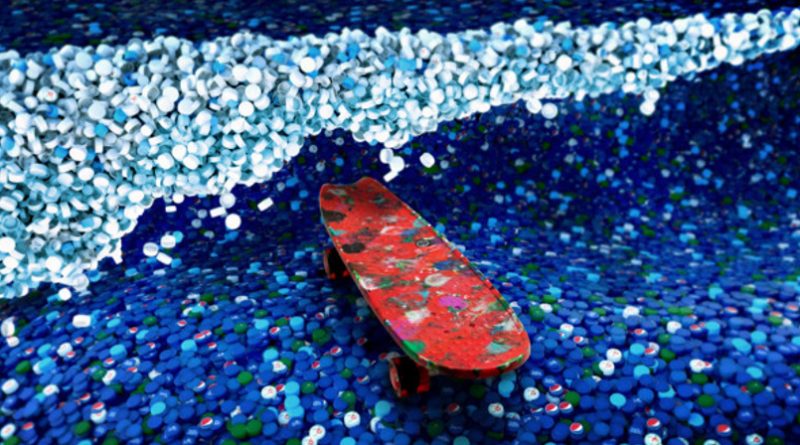Cool yet sustainable
From PET bottle caps to skateboard
In 2015, the skateboard brand WasteBoards started with the question: “Can we make a skateboard from plastic waste?” Together with the University of Applied Sciences of Amsterdam they developed a prototype. And they continued their development with a group of Amsterdam-based semi-pro street skaters. It took WasteBoards over five years to create a flawless production method to maintain their innovative design based on the colourful melted plastic cap patterns while having the right strength and stiffness, flexibility and shape. And what started in a small factory in The Netherlands, is now attracting international interest.
For decades, skateboards have been constructed of several layers of maple wood, which – cross-laminated and pressed – provide the necessary stability and flexibility to withstand extreme stresses. Dutch Amsterdam-based WasteBoards took a different path relying on plastic closures instead of the traditional wooden core.
“Our first goal is to show people that plastic waste is a great material for new cool products. We want to become a real alternative for other less sustainable skateboards. If we want to create a more sustainable world, we need to make great quality products from recycled materials. Only then we can make it attractive for people to make more sustainable choices,” says Mr Rogier Heijning, co-founder of WasteBoards.
During the development phase, the board was tested to withstand a point pressure of more than 400 kg. The deck is designed with 200 anti-slip studs and a concave. The slight fishtail is a little acknowledgement of the company‘s mission to keep plastics out of the oceans.
The bottle caps which are used for the skateboards are collected together with skateboarders, visitors to events, school children, companies, etc. Each WasteBoard is baked by hand. And every design is unique, because no caps pattern is the same.
“We have outgrown the gimmicky perception that is always associated with these kinds of sustainable products. It is very difficult to create a sustainable product that can be produced on a larger scale while still having a distinctive look that tells the story of the product: from waste to product. To be able to produce a cool looking skateboard that shows the problem and solution in one, that’s our real achievement I think,” says Rogier.
In 2021, the company’s vision to conquer the international market, became reality. WasteBoards were ready to be launched in America. For this occasion, the company created a special limited edition board: the Liberty Cruiser. They operate from their base in Atlanta from where they will service the “sacred land of skateboarding”. To celebrate this introduction, the company created a special limited edition. The design of the Liberty Cruiser is based on the colours of the American flag – symbolising liberty and opportunity but also, says the company, the responsibility to protect each other and the land and sea we live in.
And the story continues. A skateboard trade chain ordered their first batch to supply their networks in Germany, Switzerland and Austria; and countries like Indonesia, Australia and the Dutch Caribbean have shown interest in starting their own WasteBoards bakery. The principle of melting down plastic caps and turning them into new objects is not limited to skateboards. The company is already working on other objects that could also benefit from the process.

